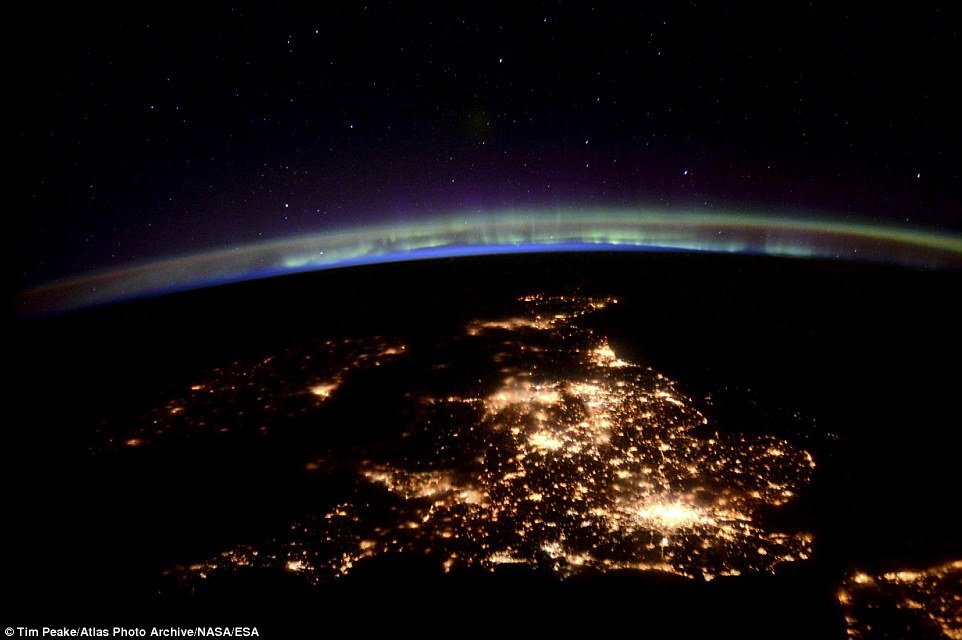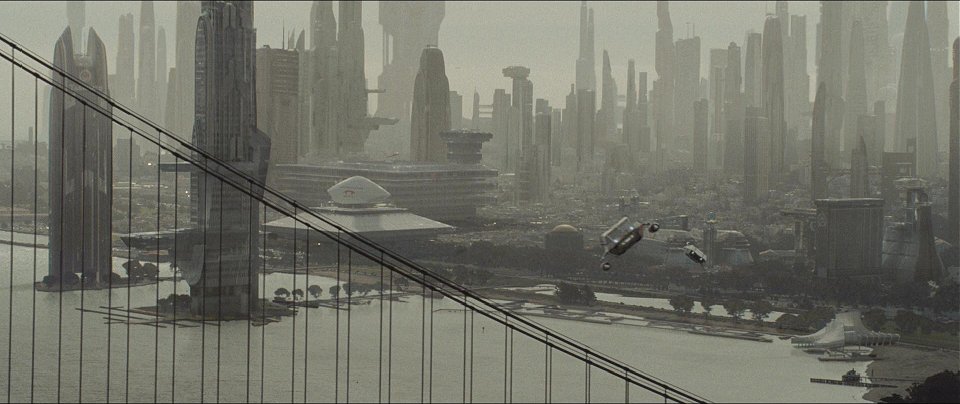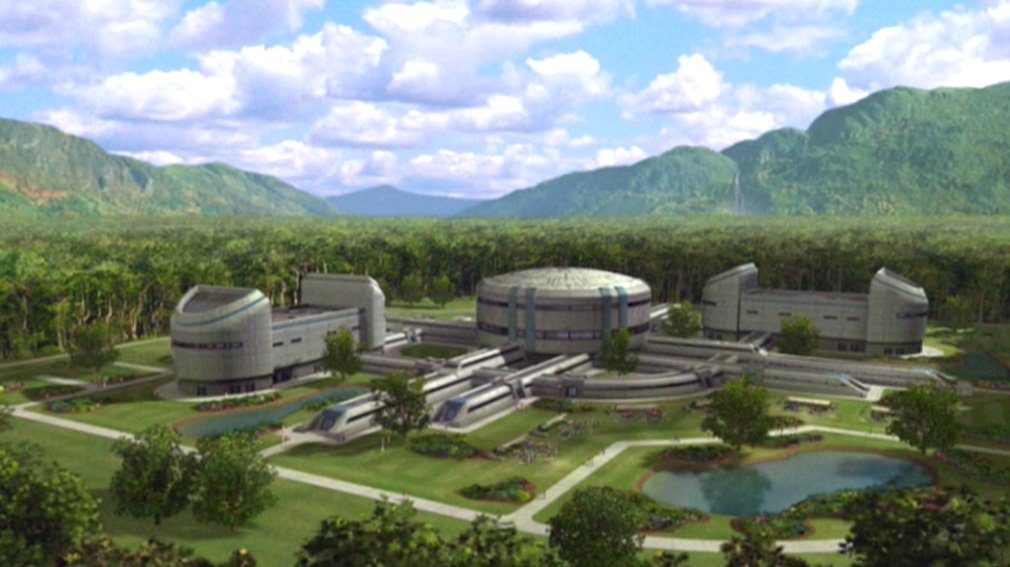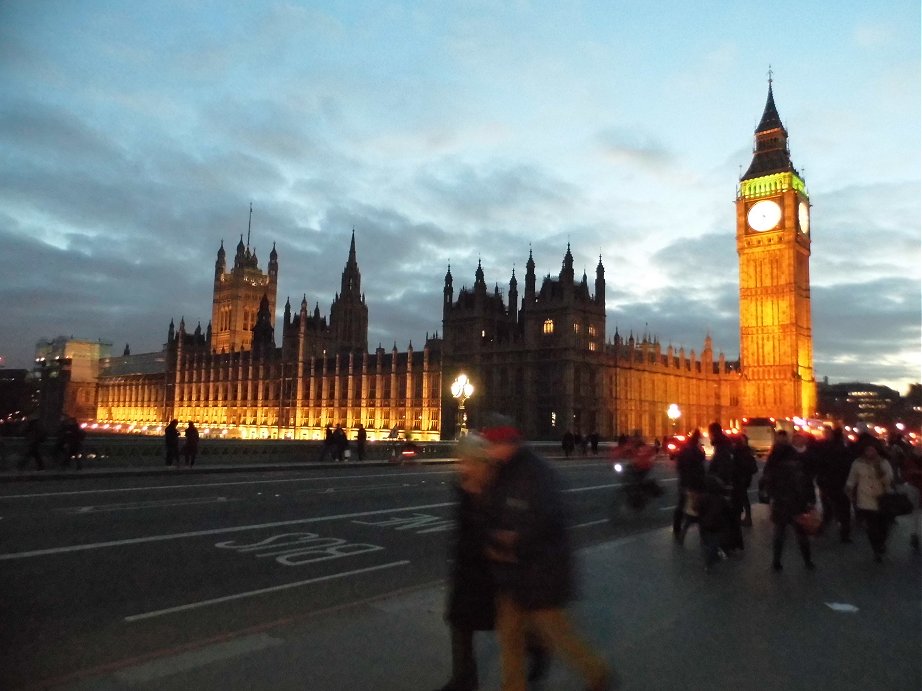

Earth: capital world of the United Federation of Planets and home to the human race. How is the planet Earth in the late 23rd Century/early 24th Century? How many people live there? What is life like? All of these questions and more are addressed on this page.
 Population:
Population:
The effects of human population increasing was felt harshly by the 21st Century. By 2017 there were almost 7.5 Billion people living on Earth.
Two factors affect Earth by the 23rd Century: the increase in population due to improved medicine ensuring birth rates high. People live longer too (see Age) and improved safety of technology means growth rate has brought the population of Earth to well over 10 billion.
Immigrants now come from another planet, not just another country. The human race now needs to address the Vulcan or Tellarite next door. Without a universal translator you might not know what to do and how does a human deal with a Tellarite arguing all the time? Itíll take adjustment. Smarty pants Vulcans taking your job because they work more efficiently than a human will surely create worker alienation and anomie.
Since the time of the discovery of warp drive, the colonial programme of Earth has been kick-started into high gear. To counter the spiralling population figures, a process of actively encouraging people to live off-world is underway. The truth is the planet cannot cope with this number of people. Debates rage in the Earth Government about stopping non-native dwellers settling on Earth as there is not even space for the indigenous people. This is a hot potato topic.
Author Notes:
By 2050 the United Nations predicts the population will be 9.7 billion. That's ENGLISH billions so 9 700 000 000 000 people. If, as Star Trek: First Contact says, World War Three kills 600 million people, then you still have 9 BILLION people left alive. That's 1.5 BILLION more than are alive now in 2017 as I type this. The planet cannot sustain the people living on it now at 7.5 billion, so there needs to be some thought about what the population is in 2270 onwards in Hawkins' lifetime. This is why I believe there will be a powerful, urgent move to colonisation and allowing the Earth to recover from the over-population of humans.
With Star Trek medicine, 100% successful birthrates with no disabilities or diseases that cannot be cured, the population of Earth will explode unless there is either a Chinese-style one-child policy or emmigration off-world is vigorously pursued as a policy. Add to this the arrival of aliens from over 100 worlds and the Earth will get very busy and cosmopolitan by 2312.
 Education:
Education:
Aptitude tests are used in the education system in order to aid the student in selecting the academic areas in which they show a natural talent or aptitude. At age 14 the student is given a full bank of aptitude tests and their educational, physical and mental records are examined. The student is then told, based on the tests and records, the areas in which the candidate has shown an aptitude (always in a positive criticism, e.g. You have an aptitude for X, Y and Z, as opposed to saying you are good at X and Y but crap at A and B). The student is then advised of the areas in which they would probably (99%) excel and thus enjoy. Mathematics and English/Standard language are compulsory and thus the screening would show if the student requires further assistance. At age 17, after passing the A-Levels/Standard exams would be screened with aptitude tests to account for changes with age (people change as they grow up) to advise the student on which degree course they would do best and get the best marks.
Thus, the summer before starting: A-Levels, Honours Degree courses etc. the student is given a full bank of aptitude tests in order to find out what the student is good at, and to see if the student requires help in either english or maths. No score is taken so student A cannot tease student B because they scored 14 points more. The absence of a general knowledge test helps to avoid cultural bias and keeps the tests multinational and avoids the aptitude tests being used as I.Q. tests and labelling the student. If a subject is not on the list of aptitudes, it merely means the student does not have an aptitude in that subject but, with further assistance, may perform that subject. The tests never preventor restrict the students range of choices. The tests are to tell the student what they are good at, never to tell them what they are bad ator that they are clever/stupid. If the student is ill at the time of the testing, unhappy with the results, or performs poorly then they can automatically resit the tests.
This system assists the student is selecting the education best suited to them, assisting them in selecting the best options and avoiding selecting courses to which they aren't as well suited.This system thus allows choice of course by aptitude and not merely "Good Vibes", "Hairs On The Back Of Neck" or "Little Angels and Devils" as has previously been the case.
The invention of transporters, shuttles and warp drive means that students aren't limited as to the location of their place of study. Thus a student born in Sheffield, England, may study in Russia, Africa, on the Moon or even on Vulcan. The advent of the Universal Translator and the U.F.P. standardised education system means that location of education has no limiting effects on the student, climate and atmosphere notwithstanding(!). With no money or material limitations, schools, colleges and universities have ample quantities of all the needed state-of-the-art equipment plus any other educational material required or desired.
Author Notes:
I never saw the purpose of GCSEs (General Certificate of Secondary Education - a UK qualification for 16 year-olds from 1988 onwards, of which I was in the first ever group). Learning facts and repeating them back parrot-fashion is NOT learning. It's recording and repeating. A-Levels onwards at least require an UNDERSTANDING and APPLICATION of the learned facts. Surely this is what someone needs to know to equip them for life? This is why I thought of a standard exam that would take an individual to 17 and then they can go to Starfleet or get a job elsewhere. Education is also about self-fulfillment, healthy mind and body and also healthy attitudes and an open-mind. Education will be more diverse and harder than it is in 2017, but you'll have computers as smart as us and other modern technology to aid in the learning process. Add to that the diversity of knowledge from other species and planets then you'll have dozens of viewpoints on any given debate.
Health:
Employment:
Author Notes:
One of the most extreme changes in the decades from 2017 to 2151 and beyond is in employment. Money is gone, Kirk said so in Star Trek IV, so we work because we are doing something we want to do, rather than something we have to do. Simple jobs are replaced by automation and you get to enjoy that period you spend at work. No money means no unemployment benefits; replicators and subspace means you can fabicte and copy music, books, movies and any object for no price. No one has a financial advantage and you can 'keep up with the Joneses' by replicating whatever the new gizmo is that they have. This is why Picard talks about human's seeking to better ourselves - because we need a new goal in this post-materialist era.
Leisure & Travel:
 Politics:
Politics:
The United Federation of Planets building is based in San Francisco. The large building seats the representatives of the 105 member races. No race has more influence politically than any other, however there is usually more prestige attached to the founder members of the Federation. The building design is a tiered circular arrangement, giving those present a feeling of unity, rather than facing off at one another as in the old Parliamentary layout of Westminster, London in centuries past.
The President of the United Federation of Planets sits in the centre of the parliament, in order that they may face the direction of the individual speaking in the UFP government building.
The Earth Government sits in the government building on the shores of Lake Malawi, in the country of Malawi, Africa. The site for the Earth Government was decided in the old United Nations as a location politically neutral of the former world superpower arrangements of the 20th Century. The building is designed to look natural, curvilinear in it's external design in order to provide a techno-organic feel. The building is designed to be the bridge between the technological and natural aspects of the civilisations of Earth.
The building arrangement internally is a scaled-down version of the UFP government buildings in San Francisco. Again, the circular seating arrangemtns for the representatives of the peoples of Earth allows for a feeling of unification, rather than division. Each country of Earth has a representative in the Earth Government, and each continent also has a representative, so that the larger issues can be discussed alongside the more local issues.
The Earth President sits in the centre of the senate building, allowing them a chance to face the representative speaking, and also to address the chamber as a whole when they themselves make a speech.
All government chambers, be they the country chambers, the planetary chambers or the UFP chambers are all broadcast live across the region that the represent, all day, every day, in order that the people represented by the government in question can see, uncensored, what the individuals they democratically elected are doing and saying. Accountability and honesty are the keys to 24th Century politics. Closed sessions of the various governments may be held under unusual circumstances, and are usually held in smaller chambers than the main chambers of government.
Political parties no longer exist in the historical sense. The elected individual represents the wishes of the people, not of any party. The old party system was finally brought down by the pendulum swinging from one extreme to another, and the writing of policies to stay in power, rather than to serve the wishes of the people. Political parties were seen as too inaccessible and too clique-ish.
Author Notes:
With a supra-planetary boy like the United Federation of Planets, politics on a street-level becomes very complicated. The BREXIT vote in the UK and Presidential election in the USA in 2016 showed that people feel ignored and powerless and want to be both heard and empowered. In the 23rd Century, politics must be more in the hands of the individual at ground level and the politicians can deal with the high-end Earth and UFP side of things. With social media and computers at a level unimagineable to us in 2017, voting towards a decision in the 2200s will be easy. There may not even be a need for political parties as a freed up electorate can vote towards their own beliefs, rather than finding a best-fit match in a political party that will always result in a compromise of ideals. With so many levels of politics as well, personal voting will allow empowerment without having to enter the electoral booth more than ever 4 or 5 years as at present.
 Cities, Towns & Villages:
Cities, Towns & Villages:
The structure of towns and cities changes by the 23rd Century. Continuing the move to online from the 21st Century, shopping for food and clothes becomes something done from the home rather than on the High Street. What does thrive are corner shops for topping up of food and supplies, rather than a full monthly shop, takeaways and restaurants, hairdressers and chemists.
With home online systems allowing rapid and easy ordering of food, clothing and furniture, the need for traditional shops disappears. The centre of a village, town or city is one of restaurants, pubs and leisure facilities (theatres and concert venues) to enhance social interactions.
Author's Notes:
This was one part of my research that was hard to do. With no money and no financial sector by the 23rd Century, just what does a city, town or village look like? Replicators and fabricators mean a lot of types of shops won't be needed. No post office, no libraries, no supermarkets and many of the other shops like charity shops will be unneeded as poverty and disease are gone too.
What would be still left are takeaway foodshops, schools and places to socialise.
To the right is an image of the home I grew up in on Carter Knowle Avenue in Sheffield. I spent many good years in this house and it forged the man who I am today. I had good times, bad times and many, many in-between. Part of my studies of the Interim Years has been thinking about how life in Carter Knowle Avenue would be different by the 23rd Century. Little was I to know that the secondary school at Abbeydale Grange would be gone by 2016. Would the same house be there by the 23rd Century? Possibly but likely to have been rebuilt as a new building or extensively refurbished.
 Environment & Wildlife:
Environment & Wildlife:
Author Notes:
Sir David Attenborough and many others have spoken of us being on the cusp of a new age of extinction. Between now and the time of Star Trek - especially with World War Three in the middle - there will sadly be many plants, animals and environments that will be lost to us. Star Trek IV spoke of the lost Hump-back whales and there will be many, many more species lost along with them. Global Warming and rising sea levels will also change the face of the planet by the 22nd and 23rd Centuries as well.
Family & Childhood:
Religion, Marriage, Death & Beliefs:
Crime & Punishment:
The Welsh eco-village Brithdir Mawr
Sheffield in the 24th Century
Starfleet Academy
Starfleet Command
United Federation of Planets
Kara-Kalpakistan and the Aral Sea
The Eden Project: 8th Wonder of the World.
Bedzed: housing for the future.









 Population:
Population: Education:
Education: Politics:
Politics: Cities, Towns & Villages:
Cities, Towns & Villages: Environment & Wildlife:
Environment & Wildlife:



